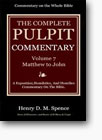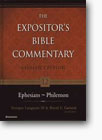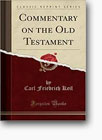Filthy Rags?
by Steve Jones
"But we are all like an unclean thing, and all of our righteousnesses are like filthy rags" (Isa. 64:6). Isaiah the prophet summed up the wretched state into which the covenant people of God had sunk. Though they had the boon of receiving the Law from Mount Sinai, though they had come out of Egypt through the Red Sea, they had turned from their Lawgiver. The children of Zion were worshipping false gods (Isa. 42:17). They were reveling in the dregs of idolatry. So much so, the prophet calls Jerusalem a harlot (Isa. 1:21) and likens it to Sodom (Isa. 3:9).
And yet, the people had an illusion of righteousness. Some of them professed to be "holier than thou," even while burning incense on strange altars (Isa. 65:3-5). But God did not esteem their righteousness to be anything but pollution. He even hated the Sabbaths and feasts that He had Himself ordained (1:13, 14). The house of Jacob's apostasy had rendered its best acts of religion unclean. Like the wind, sins were sweeping people away (Isa. 64:6).
How appropriate that the prophet would break into such hyperbole as to call this supposed goodness "filthy rags." What better way to call the nation to repentance? In the context of proud Judah's barrenness, the rebuke comes with the force of a thunderbolt.
This is most certainly the way the text should be read. We have all heard that "a text without a context is a pretext." This applies here. The "filthy rags" must be understood historically and with application to the audience: apostate Jerusalem.
This, however, is not the way many Evangelical Protestants applies the famous passage. In fact, in all of the times I have ever heard it quoted - in sermons, study guides, books, Sunday School lessons - I have never once heard anyone interpret the verse in context. References to Isaiah 64:6 are invariably made to mankind in general. The verse becomes a proof-text for the total depravity of every man including the saints. Many will say that the deeds of even the most profound disciples are nothing but "filthy rags" in the sight of God. And so, the text is made universal and theological, rather than specific and historical.
But the question needs to be asked: By what hermeneutical principle do we so use a text? What gives us the right to uproot the verse from its surrounding historical context and use it as a proof for theology? Furthermore, we should ask if a theology constructed with such methods is a sound one.
Evangelicals may argue that their application of the verse is correct because Isaiah includes himself among those whose righteous acts are unclean ("...all of our righteous acts"). But this should be understood in the light of Israel's corporate guilt. Isaiah is numbering himself among the covenant people. Those people had fallen into gross sin (though certainly not every person without exception). Therefore, he says, "our righteous acts," the acts of the nation as a whole. This is consistent with the rest of the Old Testament. For example, we find that Daniel, though godly, confessed the sins of Israel as if he were himself the transgressor (Dan. 9:3-11).
Some reading this may wonder what the fuss is all about. Isn't it nit-picky to cavil at the way one verse of Scripture is being applied? Not in this case. I say so because the misapplication of Isaiah 64:6 has a tendency to disparage, or at least downgrade, good works. I submit that it is impossible to think of righteous acts as something filthy and, on the other hand, as something essential. How could filth be important or even desirable? How will Christ judge the saints "according to their works" (Matt. 16:27) if He already esteems all works repugnant? This introduces confusion into the Christian faith.
The idea makes James the most unintelligible book of the ancient world. The author would, in effect, be writing that "faith without filthy rags is dead" and "a man is justified by filthy rags and not by faith only" and "I will show you my faith through my filthy rags" and "by filthy rags, faith is made complete."
Christians would be enjoined to "stir up love and filthy rags." And young men, according to Paul, would all be obliged to show forth "a pattern of filthy rags." The absurdity goes on and on throughout the pages of Scripture if Isaiah 64:6 is applied to all people everywhere.
The obvious teaching of the Bible is that acts of virtue and goodness are pleasing to God. He does not view them as filthy, unless they are done with false intentions (cp. Matt. 6:2). In fact, God was pleased with Cornelius' alms, even before that man was converted to Christ (Acts 10:4). This alone should negate the popular application of Isaiah 64:6.
Amazingly, the preceding verse in the book of Isaiah teaches the exact opposite of the common interpretation of "filthy rags." Listen to the prophet: "You [the Lord] meet him who rejoices and does righteousness" (Isa. 64:5). Genuine works of righteousness, says Isaiah, are valuable; God meets us when we walk in them. Are we told the opposite thing one verse later? That hardly seems reasonable.
Jesus taught that God will reward even small works, such as giving a child a cup of water (Matt. 10:42). Our Lord commands us to let our good deeds "shine before men," that they might glorify the Father (Matt. 5:16). Paul writes that we are "created in Christ Jesus unto good works" (Eph. 2:10).
The apostle erases all doubt as to how God views works of righteousness. Paul urges the saints to "walk worthy of the Lord, fully pleasing Him, being fruitful in every good work" (Col. 1:10). Notice that pleasing God is connected to righteous works. They are clearly not filthy rags in the sight of God; they are a delight to Him.
Yes, our works are imperfect. But the Scripture affirms repeatedly that our Father smiles upon our acts of goodness. No one will be saved without them. Jesus states in John 5:29 that the resurrection unto life is for those who have "done good." Paul writes that God redeemed us to make us "His own special people, zealous for good works" (Tit. 2:14). And so, the entire scheme of redemption has as a focus good works - and a glorious resurrection to those who have walked in them for Christ's sake.
No, we do not put God in our debt by doing good deeds. We cannot merit salvation by balancing our works with our sins. Salvation and forgiveness lie in our covenant status with God through Christ. But the imitation of our Lord - which includes works (Acts 10:38) - is an obligation of the covenant. It is also a high privilege and a joy.
Clearly, God does not view our righteous acts as filthy rags, but as costly apparel purchased with the blood of Christ.











Comments (11)
I agree with Steve, basically. Isaiah was praying a prayer of penitence to God for Israel. I believe historically the Jews when praying a prayer of lamentation often exaggerated their sins. I think of this as if any of us walked in and heard someone praying to God for the forgiveness of someone else's sin, we would recognize what we are hearing. God has never called our righteousness filthy rags even before Jesus came. God said that Noah and Job were righteous and others have listed many Old Testament versus showing that there were righteous people before Jesus came. Below are a few scriptures from the Old Testament. Also, I also do not believe Jesus' righteousness was inputted to us.
Gen 7:1 And the LORD said unto Noah, Come thou and all thy house into the ark; for thee have I seen righteous before me in this generation.
Job 1:8 And the LORD said unto Satan, Hast thou considered my servant Job, that there is none like him in the earth, a perfect and an upright man, one that feareth God, and escheweth evil?
(Pro 10:3) The LORD will not suffer the soul of the righteous to famish: but he casteth away the substance of the wicked.
(Pro 10:11) The mouth of a righteous man is a well of life: but violence covereth the mouth of the wicked.
(Pro 10:16) The labour of the righteous tendeth to life: the fruit of the wicked to sin.
(Pro 10:21) The lips of the righteous feed many: but fools die for want of wisdom.
(Pro 10:24) The fear of the wicked, it shall come upon him: but the desire of the righteous shall be granted.
Psa 11:5 The LORD trieth the righteous: but the wicked and him that loveth violence his soul hateth.
Psa 33:1 Rejoice in the LORD, O ye righteous: for praise is comely for the upright.
Psa 34:15 The eyes of the LORD are upon the righteous, and his ears are open unto their cry.
Psa 37:16 A little that a righteous man hath is better than the riches of many wicked.
Psa 37:30 The mouth of the righteous speaketh wisdom, and his tongue talketh of judgment.
Pro 10:3 The LORD will not suffer the soul of the righteous to famish: but he casteth away the substance of the wicked.
Pro 10:11 The mouth of a righteous man is a well of life: but violence covereth the mouth of the wicked.